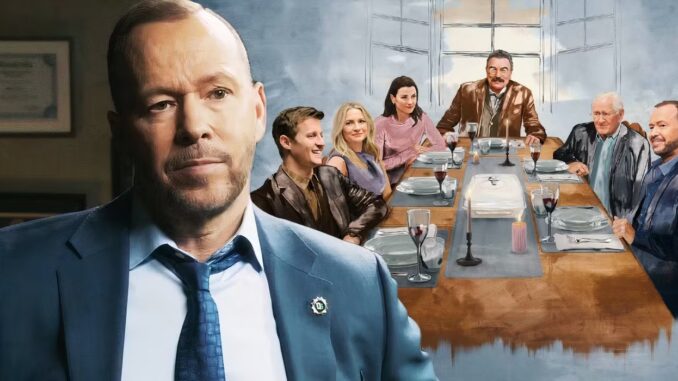
A New Chapter in the Blue Bloods Legacy
When Blue Bloods first premiered in 2010, few could have predicted how deeply the Reagan family drama would resonate with audiences for over a decade. With Tom Selleck’s stoic Frank Reagan at the helm, the CBS series became a Friday-night staple — blending police procedural storytelling with family loyalty, moral tension, and heart.
Now, as Boston Blue steps into the spotlight as its spiritual spin-off, fans can’t help but ask the big question: Can it live up to the Blue Bloods legacy — or even surpass it?
A Fresh Take on Familiar Themes
Created by the same production team behind Blue Bloods, Boston Blue doesn’t stray too far from the formula that worked so well. It centers on a new ensemble of officers in Boston, dealing with corruption, family loyalty, and moral gray areas in law enforcement.
However, what sets Boston Blue apart is its tone — grittier, faster-paced, and more emotionally raw. The show leans into the city’s working-class roots, with atmospheric cinematography that captures the tension of Boston’s streets.
Fans have praised the show for its balance between intense casework and emotional storytelling. “It feels like Blue Bloods with more fire,” one viewer commented online. Another said, “It’s not trying to copy Blue Bloods — it’s evolving it.”
The Cast That’s Winning Over Viewers
Part of what made Blue Bloods iconic was its stellar cast — Donnie Wahlberg, Bridget Moynahan, Will Estes, and Len Cariou formed the heartbeat of the Reagan clan. Now, Boston Blue brings its own lineup of strong personalities, led by Donnie Wahlberg, reprising his role as Detective Danny Reagan in a new capacity.
This time, Danny isn’t just solving crimes — he’s mentoring younger officers while battling his own inner demons. New cast members, including Lena Torres (played by Sophia Bush) and rookie detective Marcus Dean (Deric Augustine), add a fresh dynamic to the series.
Viewers have responded positively to the chemistry on-screen. Wahlberg’s gritty yet heartfelt presence anchors the show, while Torres and Dean provide emotional depth and generational tension.
Ratings Speak Volumes — But It’s Complicated
When comparing Boston Blue to Blue Bloods, the ratings tell a nuanced story. Blue Bloods regularly pulled in over 9 million weekly viewers during its prime years, dominating CBS’s Friday lineup.
In contrast, Boston Blue has averaged around 5.8 million live viewers per episode — a respectable number in today’s streaming-driven landscape. When factoring in delayed viewing and Paramount+ streams, that figure rises closer to 8 million total viewers per week.
Industry analysts point out that these are impressive numbers for a new series. “The television landscape has changed drastically since Blue Bloods debuted,” notes TV critic Angela Martin. “In that context, Boston Blue’s performance is not just good — it’s exceptional.”
Thematic Depth and Modern Storytelling
Where Blue Bloods leaned into traditional values and family dinners, Boston Blue aims for a more contemporary moral palette. The show dives into issues such as police reform, community distrust, and media pressure — portraying officers not as flawless heroes, but as conflicted people navigating a complex system.
Episode three, “Lines We Cross,” sparked debate for its portrayal of ethical compromise within the department. Critics praised it for “refusing to simplify good and evil,” calling it one of the boldest hours of network television this season.
This approach resonates with modern audiences who crave emotional realism over idealized heroism. As one fan wrote on X (formerly Twitter):
“Boston Blue hits harder because it feels real — messy, human, and honest.”
Donnie Wahlberg’s Star Power and Leadership
Donnie Wahlberg remains the connective tissue between the old and new. His transition from Blue Bloods veteran to Boston Blue mentor feels organic, and his real-life pride in the project shines through.
In a recent interview, Wahlberg said:
“Boston Blue is not just another cop show — it’s about people trying to do the right thing in a world that’s constantly changing. That’s what keeps me passionate.”
Fans appreciate his authenticity and commitment. Many see Boston Blue as a “second act” for Wahlberg’s character — one that allows him to explore Danny Reagan’s growth beyond the Reagan family table.
Critics Weigh In: Familiar but Fresh
Early reviews for Boston Blue have been largely positive. Variety called it “a confident and emotionally layered continuation of a beloved TV universe,” while TVLine praised its “sharp writing and standout performances.”
Some critics note that the show occasionally relies too heavily on Blue Bloods nostalgia, but others see that as a strength. “It’s smart brand evolution,” said one entertainment columnist. “Fans get what they loved before — but with new stakes, new characters, and a tougher edge.”
Fan Reactions: A Split Between Nostalgia and New Energy
Social media tells its own story. Longtime Blue Bloods fans initially expressed skepticism, worried Boston Blue might “replace” the original. Yet after the first few episodes, sentiment shifted.
Now, hashtags like #BostonBlueCBS and #DannyReaganReturns trend regularly, filled with posts celebrating Wahlberg’s return and praising the show’s emotional arcs.
Still, some fans admit they miss the Reagan family dinners — the signature moment that Boston Blue doesn’t replicate. Instead, the show substitutes “barroom debriefs,” where officers gather after long shifts to share a beer and their moral struggles — a modern, grittier echo of family bonding.
The Verdict: A Worthy Successor with Its Own Identity
So, is Boston Blue matching Blue Bloods’ success?
Maybe not in pure numbers — at least, not yet. But in terms of cultural relevance, storytelling evolution, and audience connection, it’s absolutely holding its own.
It captures what made Blue Bloods great — moral complexity, heart, and humanity — while adapting those qualities for a new generation of viewers.
As one critic summarized perfectly:
“Boston Blue doesn’t need to replace Blue Bloods. It just needs to remind us why we loved it — and show us there’s still more story left to tell.”
